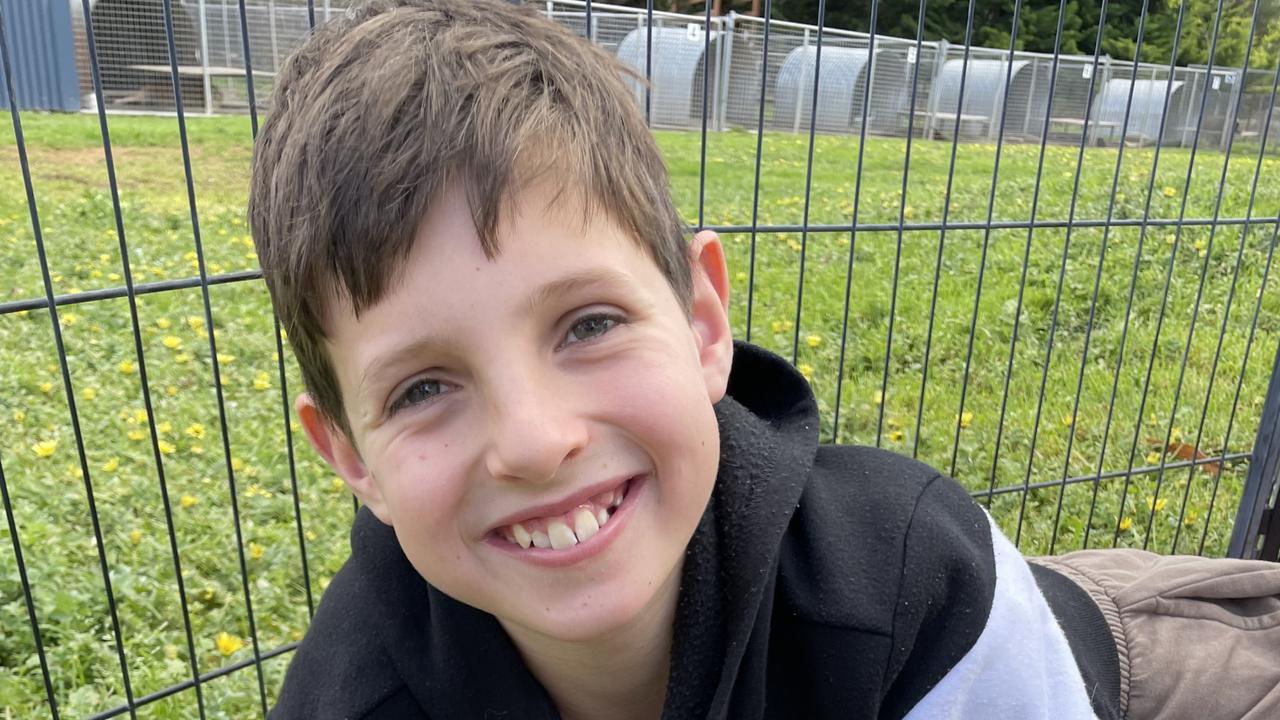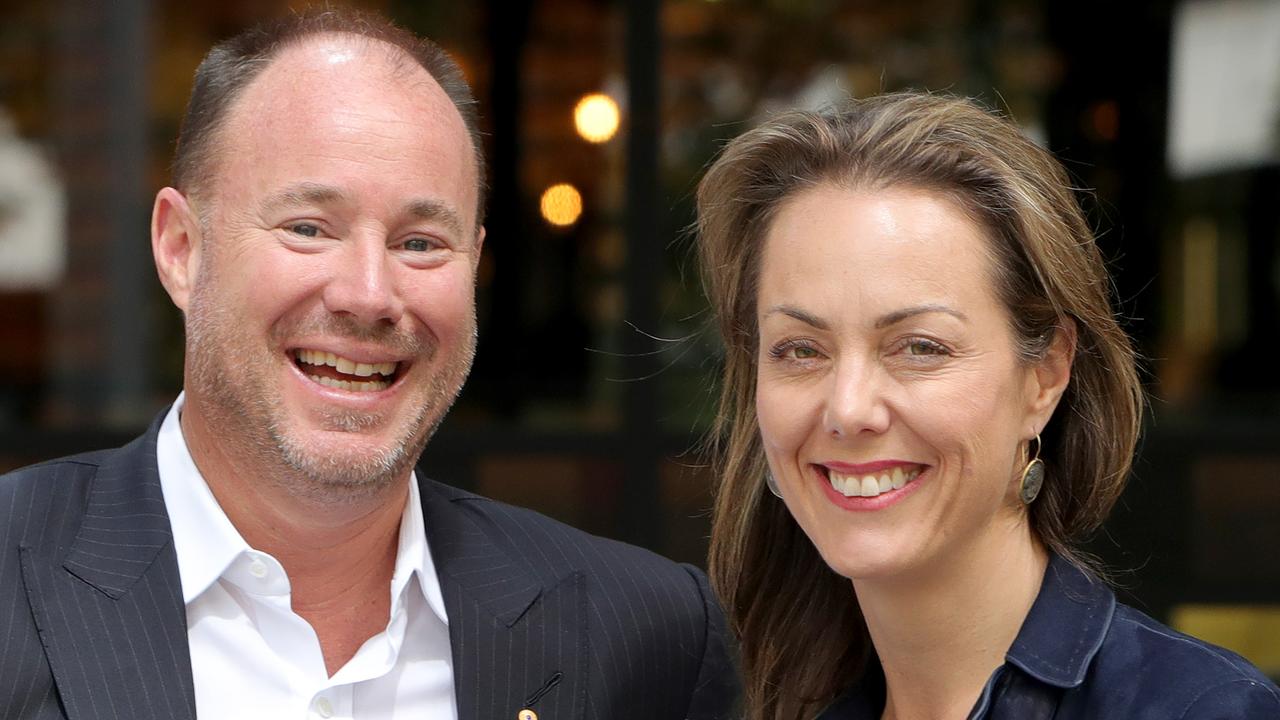Australian boxer Harry Garside reveals his journey to self acceptance
Champion Australian boxer Harry Garside says he has always felt “a little bit different” and not comfortable in his own skin. Here he reveals the journey he’s making to discover his true self.
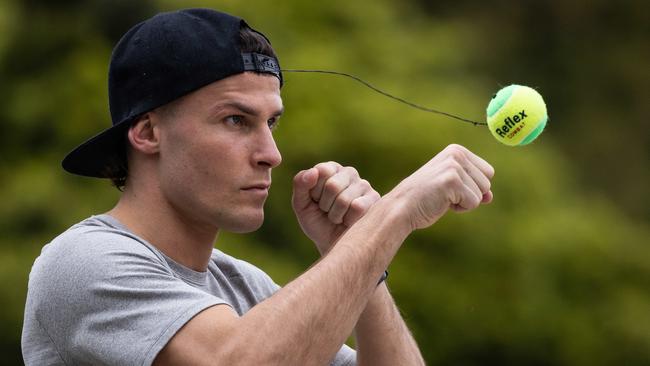
Victoria
Don't miss out on the headlines from Victoria. Followed categories will be added to My News.
Harry Garside grew up in Melbourne and never felt completely comfortable in his own skin – until more recently. We spoke about ballet, skirts, boxing, Olympic medals, painted nails, and what’s next.
HM: How well do you know yourself?
HG: I like to think pretty well, but the more situations I put myself in, the more you find out about yourself and the more you realise that you’ve only scratched the surface on getting to understand yourself.
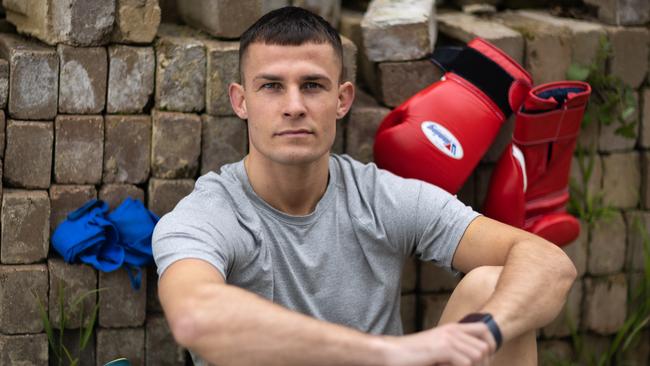
HM: Your home environment, you say, was very masculine. You’re one of three boys – describe what it was like to grow up in the Garside family.
HG: I look back on my childhood with mostly positive memories. Being the youngest of three boys coming from a very masculine environment, I felt very different to my two older brothers. They were always out the back playing with Dad, playing with power tools, playing with dirt, and I was more in touch with my mum and what my mum was doing. I think as a young boy, all I wanted to do was fit in, all I wanted to do was be like my two older brothers and my dad – but I didn’t want to do the things that they were doing.
HM: Why?
HG: I didn’t feel connected to the things that they were doing. It felt like a bit of a force to do that, so for me I was more in touch to do what my mum was doing. Looking back, it’s probably the reason why I started boxing: to prove I was a man.
HM: So you felt at that time that you needed to prove yourself as a man to your brothers and to your dad, Sean, and to the world?
HG: Yeah, and I don’t know if I knew that consciously, but I can definitely look at my life retrospectively and I felt I didn’t get much respect. As a kid, it’s not what happens to you, it’s how you feel about what happens to you, and they never once said things or did things, but I just felt like I wasn’t like them – I just felt a little bit different. They weren’t boxers themselves, but they’re always pretty rough, my brothers – always fighting with each other or fighting on the footy field or getting kicked out of class – and I just wanted to be like them. I think I started boxing to sort of prove I was a man, to prove that I was more like them, and then I just fell in love with the sport.
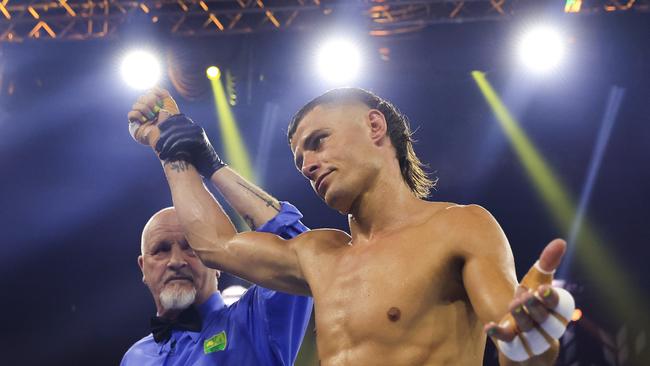
HM: It’s amazing when you speak to people now, how many people felt they needed to be someone they weren’t when growing up.
HG: Yeah. It’s probably the reason why I like to challenge gender stereotypes. It’s a massive part of my identity and who I am. We, as humans, we feel this pressure to live up to other people’s expectations and to be what everyone else wants us to be. I felt that the reason why I started boxing was because I wanted to prove to everyone else in my family that I was a man, I wanted to prove that I was just like them. And luckily at the age of 20, I started to challenge all this stuff and learn to love myself, or start to do a self-discovery journey and learn to love myself with the good, the bad and the ugly and whatever comes out– who am I?
HM: So the nail polish and the skirts, that’s to say to the world, “I’m a man, but I can be different, don’t judge me.”
HG: Yeah – I feel it was a bit of a middle finger to everything we’re told and that’s all I try to do. We should question everything. I could be wrong – I find beauty in eating a bit of humble pie every now and then – but I still think we should challenge everything we’re told, everything that our parents were told, their grandparents were told, about how to live their life. My view is just as good as anyone else’s, and a homeless man on the side of the streets is just as good as anyone else’s. We should always challenge. That’s all I try to do.
HM: When you were growing up, did you sense that your brothers wanted you to be someone else? Or was that you getting it completely wrong, putting pressure on yourself and then living day by day with anxiety and concern and the feeling of “I’m not who I should be”.
HG: I probably felt that in the home environment and then I entered school at the age of five and your teachers sort of pushed your identity on you: “Oh … you’re a Garside.” My brothers all got kicked out of classes; my middle brother Jack got suspended in his first week of primary school. I entered the school, and I think that was pushed on me – I felt a little bit of pressure and I remember going home and just like viewing them and scanning them. What were they doing? How are they acting? And I went to other environments outside of my family environment and I started acting like my brothers, I started acting like someone else, because I felt that’s what I needed to do.
HM: You acted unnaturally – you felt a pressure to act in a way that wasn’t you?
HG: Exactly. I was a Garside, and I felt I had to live up to the stereotype. I probably did that most of my schooling life. Even now, when I see people from my childhood, I sort of fall into playing the role of the person I was 20 years ago, you know what I mean? It’s interesting to look back on my life and realise that I was showing people the wrong version of myself because I was too scared of what they were thinking of who I actually was.
HM: When did you become comfortable being Harry Garside: the authentic, legitimate Harry Garside?
HG: The pivotal moment would’ve been at Reach one day, Jimmy Stynes’ foundation. I was 16 years old, and my life took a different turn. I started the self-discovery journey, where I really delved into myself. That’s the most beautiful thing about the Reach Foundation – it gives young people the opportunity to discover themselves and to stumble, to fall, to triumph, to experience things, to hear other people’s stories about how life impacts them.
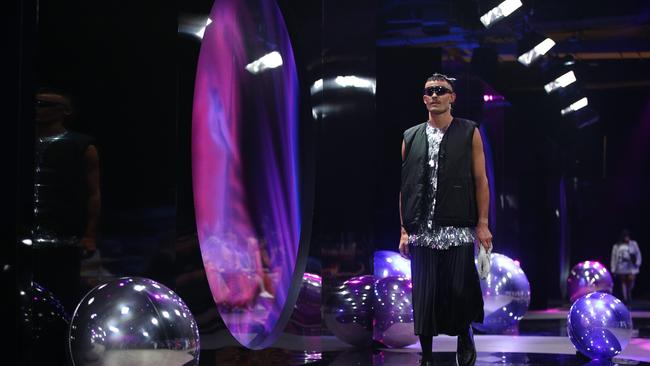
HM: Reach came at a time when you needed them?
HG: They did. I mean, life as a teenager, life as a kid, can be crazy. All this is happening in the world, you’re thrown into a melting pot and you’re just supposed to adapt. I’m so grateful that they entered my life because I truly delved into myself and I got the opportunity to explore more of myself.
HM: What did you find?
HG: I’m still working it out, but I found a loving, caring, compassionate, someone who’s full of struggle, full of pain, but still a beautiful human.
HM: How did the discovery journey occur?
HG: I went to be a participant. At the end, they said, “We’re just going to leave this stage open for you all, and if there’s anyone in the crowd that has a burning desire, that fear, that anxiety, your stomach’s churning, that’s an indicator to push through and get up on stage.” You could sing a song, you could dance, you could do whatever you want. I had all this fear and anxiety, it was my first training session I had to prove myself, so I got up and I remember I called my mum.
HM: On stage?
HG: Yeah. I put her on speaker – everyone could hear – and I told her I loved her. For our family, we knew we loved each other, but we never said it, and for me at the age of 16, I was going through that rebellious stage with your parents, arguing a little bit more. So I called my mum and I told her I loved her. The first thing she said is, “Are you OK?”
HM: Why do you think Kate or Sean, your mum and your dad, never told you, or didn’t tell you as much as they should, and you don’t tell them or didn’t, that you love them?
HG: I don’t know what it is, I’m not too sure. My dad actually is big on physical touch. That is probably his love language. Often he would give me a kiss and a cuddle. Both my parents are beautiful people, but I think it’s the vulnerability of saying those three words: “I love you.” It’s the ultimate vulnerability, when you truly mean it. Maybe there’s that fear of if they don’t say it back?

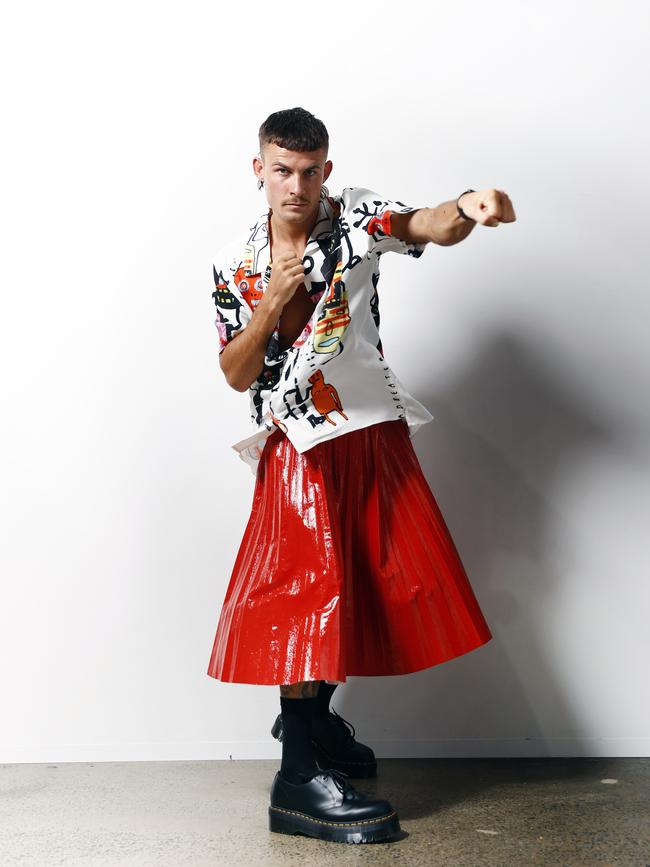
HM: You were at the farm the other day. When you drove out, my wife, Soph, said, “He is so kind and so articulate and self-assured.” Is that the reality?
HG: I’m messed up just like every other human, Hame!
HM: In what way?
HG: For me, there’s just a belief inside myself that I’m not good enough, that I’m not worthy enough, that I can never meet the expectation of myself, and I’m striving for amazing things so other people think that I’m good enough. I’ve done a lot of work on myself, but I still have that internal battle of thinking I’m not good enough and thinking I’m not worthy.
HM: How do you manage it?
HG: I try and find silver linings. There is someone inside who tells me I am good enough, I am worthy enough, but it’s that constant battle between my light and my dark. I’ve done things in my life that I’m not proud of. I’ve battled addictions throughout my life – addiction stems from pain and misery; you’re self-soothing. That’s where addiction comes from – it’s to try and pull yourself out of feeling pain, out of feeling a negative emotion – and I’ve battled with that my whole life.
HM: Where does the pain come from?
HG: I don’t know where it stems from. I know it’s in my family: my brother has dealt with it his whole life, my dad as well, and other people through my family. But it’s crazy that as humans, we can feel things so deeply, and I think I’m just one of them. I feel things very deeply.
HM: What addiction have you been battling recently?
HG: Throughout my life, it’s always varied. There’s been a period where it was sex addiction; a period where there’s been substance abuse; a period where I’ve been addicted to validation, success, ambition. Some of these are positive, some of them socially accepted – just like success, just like validation, just like results, Commonwealth Games gold medal ... everyone celebrates you, that’s an addiction. There’s been others that have been more negative, more detrimental; they leave you with shame, guilt, something that you don’t want people to find out about yourself – and it’s varied. There hasn’t been one consistent, it’s all varied.
HM: Which haunts you now?
HG: Addiction to success is probably the most consistent. And also that “if and when mindset”. “If I have that, I’ll be happy.” I think our society is just built on that, we’re breeding that with young people, and it’s sad because I know that when you reach that you’re still not going to be happy.
HM: “If I win an Olympic medal, I’ll be happy.” You did it – were you?
HG: No, I still felt the exactly the same as when I was in quarantine heading over to Tokyo.
HM: Really?
HG: Yeah. The same thing happened with the Commonwealth Games. Gold. That was a success, absolutely. But I often think, “What happens if I won a gold medal instead of a bronze medal at the Olympics? Would I be happy then?”
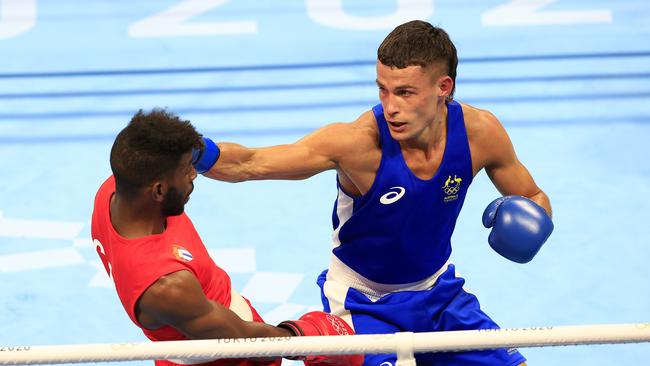
HM: What is the answer?
HG: I doubt it. They say the grass is greener on the other side. But the reality is the grass is greener where you water it.
HM: So how do you then overcome the “if and when” syndrome?
HG: I’m not sure. My whole life from the age of seven, Olympic glory has been my dream, my ambition. Watching Grant Hackett in 2004, I saw my family just so captivated by him. The thing that I wanted most in my life was for my family to look at me like they looked at Grant when they were watching him. That’s where it stems from.
HM: Validation. Love.
HG: That’s it. The ebb and flow of life is what makes it beautiful, and accepting the season that I’m in, and accepting the period that I’m in, and the ups and downs of life, is important. And also feeling that I’m actually at my best when I’m striving for something great, when I’m striving for a goal – I actually am the best version of myself when I do that.
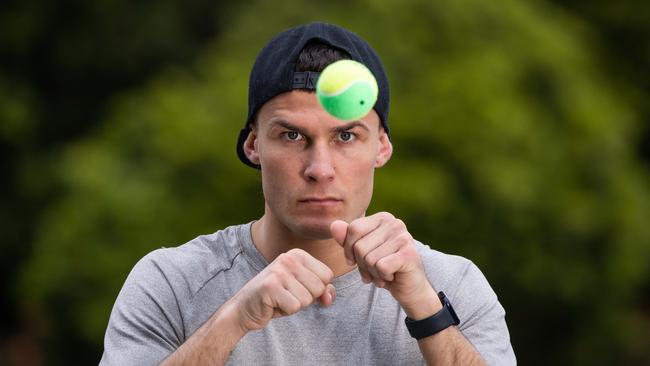
HM: I was listening to something the other day and I read a line along the lines of “the secrets we keep make us sick”. It’s like when you’re harbouring things and not discussing and talking about them. I guess that’s the point of this, right? It’s like showing people that talking helps. Is there anything that you still aren’t prepared to actually discuss?
HG: Oh, there would be a lot, to be completely honest. My close circle knows everything. Just over a year and a half ago, prior to the Olympics, I very much viewed the world in sunshine and rainbows glasses. But then post Olympics, I realised that with the media, with the public, with social media, people can attack you pretty hard and that stuff hurts.
HM: It clearly affects you.
HG: It does – even though you know that the person it’s coming from doesn’t know you. But it still hurts, it’s not nice to hear. I think there’s nothing inside of me that someone doesn’t know, which I’m grateful for. There’s nothing inside of me that I’m that ashamed of that no one knows. My mum’s always been a rock for me; she knows everything about me. I love her for that. And there’s been a couple others as well that I can rely on and trust in, for sure.
HM: My grandmother said to my mother: “Whatever happens, tell me, we’ll work it out.” My mother passed that onto me. I now find myself telling my kids, “there’s nothing that we can’t solve together”. I doubt that’s the case with all relationships, there’s not that ability to discuss, and that’s the one thing we’ve tried to have in our house, this open forum where whatever you’ve done, it’s going to be OK. But it’s not always the case with people feeling free to talk.
HG: I think it’s a bit of a recipe for shame and guilt if you feel that you can’t talk.
HM: What do you fear most?
HG: I’m scared of dying tomorrow and not living the life that I wanted, or fear of regret, fear of failure. But I think the ultimate fear, which is probably the thing that I harp on the most, is not being your true, authentic self. Would people still love me?
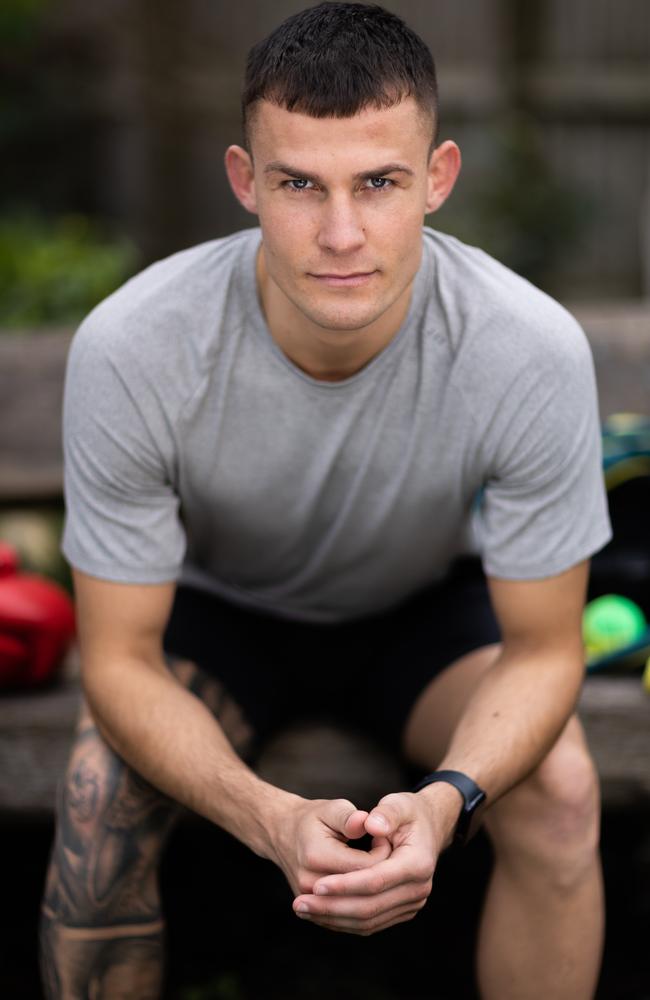
HM: So what does your true authentic self look like?
HG: The worst thing is I’m just going to contradict myself, because I don’t know him.
HM: Still searching?
HG: Yeah, I don’t know him. I’m in the process of discovering more and I’m quite philosophical, Hame, I think about it way too much way too often!
HM: Have you worked out your “why”? What it is that you feel you are here for? I don’t know, by the way.
HG: It’s something I’ve really pondered recently, to be honest, around my life – the Olympic journey, the Olympic glory, that was my goal from the age of seven until I was 24, 25. That was my goal, that was my ambition, it was very much self-focused. I finished the Olympics and I didn’t feel complete; I had latched myself to something and it wasn’t the thing. Now I find value in youth work; I’ve done a fair bit with the Reach Foundation throughout my life as a crew member. I find value in that, I find value in talking, I find value in discovering things. I’m not fully certain what my “why” is, but I do know that it’s got to be bigger than what I’ve done.
HM: How often do you wake up feeling unhappy or lonely?
HG: A shit answer – most days.
HM: What are you missing?
HG: Just that ultimate acceptance of myself. I’ve started the journey and I’m well and truly in it, but there’s still so much that I need to navigate.
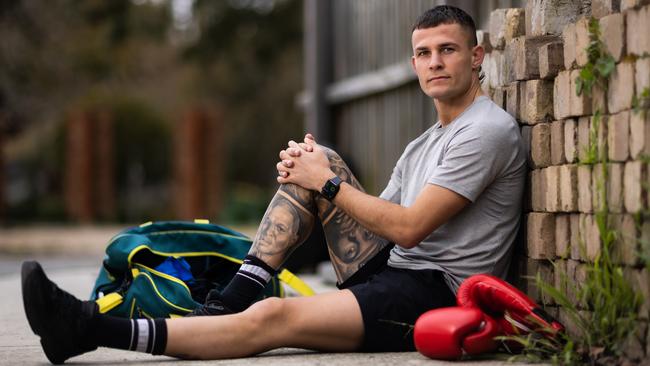
HM: What do you feel when you wake up?
HG: Tired, congested, excited.
HM: Congested with?
HG: The brain just feels heavy.
HM: Like?
HG: A bit of everything, Hame, to be honest. Just feeling a little bit lonely at the moment. I’ve been through a couple of breakups in my life, and after I always seem to just throw myself into a goal. I’m lucky I’ve got a few of them this year, and I know it’s a little bit of a distraction, but I’m just a little bit congested in my brain, processing it all.
HM: When you forecast it out 10 years’ time, what does a happy life look like for you?
HG: I hope I am someone who’s super secure, someone who’s just content. I can picture myself viewing the ocean. I’ve got kids in the pool, I’ve got a partner there somewhere – I can feel the presence of someone else, another adult. So that’s where I am.
HM: Happy, healthy, content with a family.
HG: Sounds like the dream, hey Hame.
Harry Garside is this week’s subject in the new series called Let’s Talk, released on Sunday evenings on afl.com.au and aia.com.au/letstalk.
More Coverage
Originally published as Australian boxer Harry Garside reveals his journey to self acceptance



